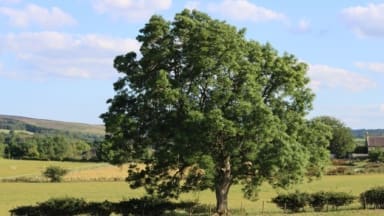
There are 125 million ash trees in England, Scotland, and Wales, and it is estimated that we could lose up to 80% of these to ash dieback.
First identified officially in the UK in 2012, ash dieback is a highly destructive disease caused by a fungal pathogen, Hymenoscyphus fraxineus. Originating in Asia before spreading to Europe, the fungus has already destroyed more than 80% of young ash trees in Norway. The fungus penetrates the leaves of ash trees, before growing inside the tree, eventually blocking its water transport systems and causing it to die. Spores of the fungus travel in the wind, spreading easily and making it difficult to limit its impact.
Since its launch in 2018, Earthly Biochar has been on a mission to tackle the issue of excess carbon dioxide in the atmosphere and the resulting climate change emergency through biochar, a sustainable form of horticultural charcoal. Whilst also known as an effective soil improver, biochar is also a trusted method of carbon capture. In 2022, Earthly Biochar discovered that biochar has potential as a treatment for ash dieback.
Earthly’s Founder, Lottie Hawkins, explains: “We visited a farm in Wales that had two woodlands, both with ash trees, and both suffering from ash dieback. A farmer who makes his own biochar to EU regulatory standards, and in an attempt to save his ash trees, he top-dressed biochar around the base of the trunks. He did this on half the trees with ash dieback and left the other half alone. One year went by, and the untreated ash trees had little new growth and looked withered; they looked like they were dying. In contrast, the biochar-treated ash trees have bushy, deep green new growth and look far healthier than their counterparts. This was ground-breaking information, and we decided to take the private research forwards, and apply for government funding to create a citizen science project that can test biochar treatment on a much larger scale across the UK.”
Hawkins and team are now looking to engage citizen scientists to embark on a research mission that could potentially save Britain’s ash trees from this killer fungus. “We’re asking members of the public to come forward, become citizen scientists, and help us help the ash trees. Similar to the Big Garden Birdwatch from the RSPB, we’re hoping people will get involved, document their natural surroundings, and help our natural environment”.
Hawkins wants people to alert them of local ash tree(s) and register them using the new ash dieback website. Earthly Biochar will then send out biochar for people to apply directly to the tree, or to be sent to the landowner, council, or forestry commission depending on the location of the tree.
“Our mission is to help save the ash trees, not just through the application of biochar but also by reducing the need for mass felling. We know from French research that 20% of ash trees have a genetic advantage allowing them to live successfully with ash dieback. If we can use biochar to improve the health of the other 80%, then we could move towards only felling single trees if they’re a health and safety hazard. With mass felling, the healthy ash trees that have this genetic advantage will also be felled. We need these 20% to repopulate and pass on their genetic advantages, therefore protecting more of our future ash trees”. explains Hawkins.
In addition to saving the trees, the species that rely on the ash are also of concern. There are 115 Ash-related species made up of insects, microbes, plants, and birds that would risk falling into decline when the ash trees have gone. In addition, the cost of losing the ash trees should also be considered, which is estimated at £15 billion to local authorities and councils in the safe removal of the dead trees.
“As a PhD student and founder of Earthly Biochar, I realise the significance of this type of research and the scale required to make it robust and meaningful. The early-stage idea of a model based around crowdfunding and sponsorship, to enable citizen science, using landowners, farmers, and volunteers to apply biochar to diseased trees and document the results, was born out of discussions with tree surgeons, academics, landowners, and our team. For every ash tree treated with biochar, we will sequester 125 kg of CO2. Scaling this up, we could see thousands of litres of biochar production being independently funded, capturing carbon, and potentially building disease resilience in our ash trees. At the moment, we’re set to lose 80% of our ash trees, and if biochar can even save half of these, we must act. We need to be trying everything we can to save our trees and we’re very confident that we can do this, but to do this, we need people’s help”, says Hawkins.
Full details on being a citizen scientist to help save Britain’s ash trees, visit Earthly Biochar.

